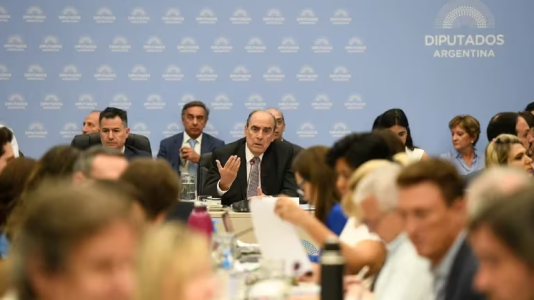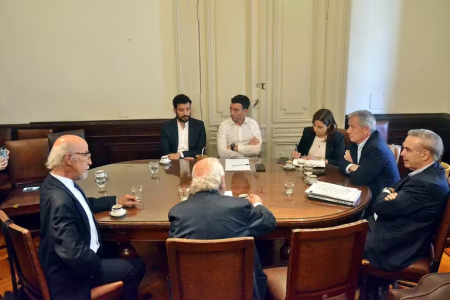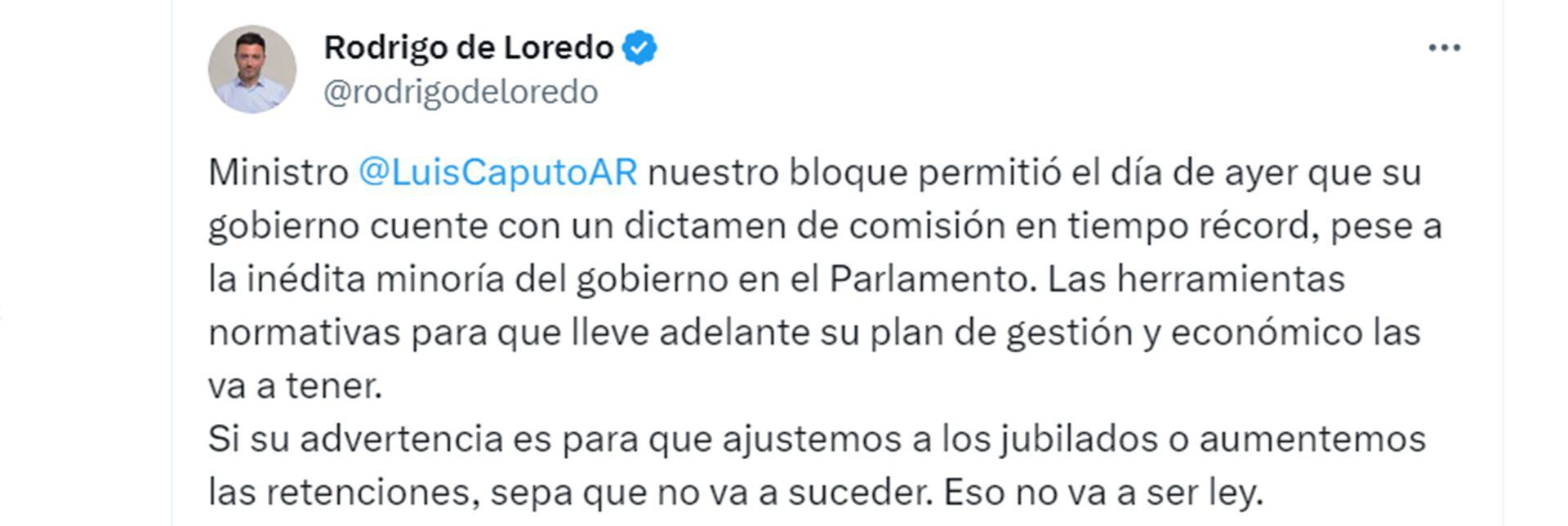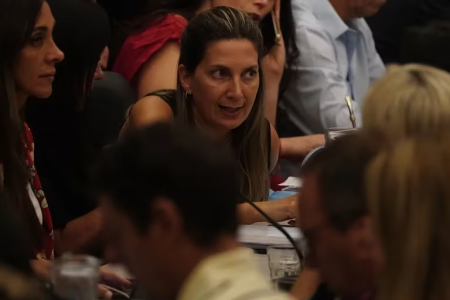Val
New member
Omnibus Law: the five points without consensus that could be rejected in the Chamber of Deputies - Infobae

Source:
This Wednesday the project obtained an opinion, but the PRO, sectors of radicalism, We Make the Federal Coalition and Federal Innovation accompanied with dissidence. Due to lack of agreement, the session was postponed until next week
By Federico Millenaar

Guillermo Francos on the committee schedule of the Chamber of Deputies
The Government overcame the first obstacle in the race to approve the Omnibus Law : in the early hours of this Wednesday it managed to obtain the majority opinion in the plenary session of commissions after frenetic negotiations with the dialogue opposition. However, the talks bogged down again and the session scheduled for tomorrow had to be postponed until next week .
The ruling party added 55 signatures from the 115 members of the plenary, but 34 were “with partial dissent”, even from its closest allies, the PRO. The UCR split in half, of the 16 members of the plenary session, 8 voted with the ruling party and the rest decided not to accompany any opinion. It was a way of making explicit their intentions for the Government to continue making changes to the text.
Something similar happened in the interblock led by Miguel Ángel Pichetto, We Make the Federal Coalition , since the Civic Coalition, the socialism of Santa Fe and Margarita Stolbizer signed their own minority opinion, separately from Peronism that rejected the text completely.

Deputies of the UCR and HCF
Withholdings continue to be the main focus of conflict. Last Thursday the Government had taken the first step to bring positions closer when it sent Santiago Caputo, the main strategist of the ruling party, to inform that they agreed to eliminate the increase in withholdings to 15% for all regional economies , but left the 15% increase firm. % to industrial exports and the increase in the rate for soybean, wheat and corn derivatives.
Although the gesture was well received, the dialogue opposition and even sectors of the PRO indicated that it was not enough. They seek to ensure that there is no increase in withholdings and are putting pressure on Economy Minister Luis “Toto” Caputo to agree to “ compensate ” those resources that will not enter the public coffers, focusing on other tax expenses.
For example, the Civic Coalition insists on suppressing or modifying the promotion regime and tax benefits of the Tierra del Fuego Regime, which they estimate costs the States USD 1,000 million a year.
In that sense, they propose the elimination of the 'presumptive tax credit' of VAT, which constitutes a mechanism that allows companies in Tierra del Fuego to collect VAT from their clients (consumers or retailers) and not pay it to the State, but rather capitalize it as profit. . In addition, they seek the elimination of tariffs on the import of cell phones and notebooks so that there is more competition and that the beneficiary companies of the Tierra del Fuego Regime do not pass on the loss of tax benefits to prices.
From radicalism they also pointed out that some regional economies do not appear on the official list of 35 sectors that will continue to have zero withholdings.
On the other hand, the libertarians left aside their original plan related to retirements : eliminating the pension formula to replace it with increases by discretionary decree. Instead, they had agreed to adjust salaries based on the Consumer Price Index , but starting in March , that is, with February inflation.
The alternative of applying the current formula until March and then beginning to update based on the CPI of the previous month was considered “superior.” However, the connection between the two systems would leave out the January update, which will end with inflation of approximately 20%. For this reason, the opposition continues to demand some extra compensation so that the “splicing” does not harm retirees, or to directly start updating by CPI from January.

The message of Rodrigo De Loredo
In a strong confrontation with the Minister of Economy, Luis “Toto” Caputo , the head of the radical bloc Rodrigo De Loredo announced that the radicals will not vote on these two chapters if new changes are not made.
“If your warning is for us to adjust retirees or increase withholdings , know that it is not going to happen. “That is not going to be law ,” He said in response to the minister's warning, who had warned that if the Omnibus Law falls, “the adjustment will be greater in the provinces.”
Given that Unión por la Patria has 99 deputies (today it suffered the fracture of three Tucumans who respond to Governor Osvaldo Jaldo) and the Left Front adds another 5, all the articles of the law are based on having 104 votes against . Therefore, the rejection of the 34 deputies of the UCR or of an important part of the bloc is enough to reach a majority of 129. “We can reject any article if the Government does not negotiate,” warned a radical deputy at the close of the plenary session. .
In another attempt to reach consensus, the ruling party agreed to exclude YPF from the extensive list of state companies that can be privatized . Radicalism pushes that the sale of each company be treated separately and demands that the sales documents have to be approved by Congress. Meanwhile, the Pichetto bloc also resists the sale of ARSAT, Nucleoeléctrica, Banco Nación and YMAD.
Regarding the liquidation of the ANSES Sustainability Guarantee Fund , the governors proposed at the beginning of the week that before transferring it to the National Treasury, it should be used to settle debts with provincial funds and to pay retirement claims, which are around 300 thousand.
Despite the approval of the governors, doubts still persisted within the radicalism that does not feel comfortable liquidating the assets of the fund.

PRO deputies in the plenary session of the Deputies' commissions (Franco Fafasuli)
Finally, it was not enough that the ruling party had accepted that the delegated powers were for one year, renewable for another year with the agreement of Congress (the original proposal was 2+2 at the discretion of the Executive Branch).
The Civic Coalition pushes to completely eliminate delegated powers while the UCR wants to restrict the number of areas in which the emergency is declared and limit the margin of action of the Executive Branch in the areas where powers are delegated.
“ Our party never voted for them, it was born by not voting delegations for Domingo Cavallo in 2001. ” Although in a limited way we are going to offer emergencies to the Government,” said Juan Manuel López during the plenary session of commissions.
The lack of consensus represents a political problem for the Government but also an economic one in the short and medium term, since its commitment to achieving zero deficit - the cornerstone of its economic plan - is based on the premise that the State will collect more with the increase in withholdings (and Profits) and could use retirements as an adjustment variable.

Source:
This Wednesday the project obtained an opinion, but the PRO, sectors of radicalism, We Make the Federal Coalition and Federal Innovation accompanied with dissidence. Due to lack of agreement, the session was postponed until next week
By Federico Millenaar

Guillermo Francos on the committee schedule of the Chamber of Deputies
The Government overcame the first obstacle in the race to approve the Omnibus Law : in the early hours of this Wednesday it managed to obtain the majority opinion in the plenary session of commissions after frenetic negotiations with the dialogue opposition. However, the talks bogged down again and the session scheduled for tomorrow had to be postponed until next week .
The ruling party added 55 signatures from the 115 members of the plenary, but 34 were “with partial dissent”, even from its closest allies, the PRO. The UCR split in half, of the 16 members of the plenary session, 8 voted with the ruling party and the rest decided not to accompany any opinion. It was a way of making explicit their intentions for the Government to continue making changes to the text.
Something similar happened in the interblock led by Miguel Ángel Pichetto, We Make the Federal Coalition , since the Civic Coalition, the socialism of Santa Fe and Margarita Stolbizer signed their own minority opinion, separately from Peronism that rejected the text completely.

Deputies of the UCR and HCF
Withholdings continue to be the main focus of conflict. Last Thursday the Government had taken the first step to bring positions closer when it sent Santiago Caputo, the main strategist of the ruling party, to inform that they agreed to eliminate the increase in withholdings to 15% for all regional economies , but left the 15% increase firm. % to industrial exports and the increase in the rate for soybean, wheat and corn derivatives.
Although the gesture was well received, the dialogue opposition and even sectors of the PRO indicated that it was not enough. They seek to ensure that there is no increase in withholdings and are putting pressure on Economy Minister Luis “Toto” Caputo to agree to “ compensate ” those resources that will not enter the public coffers, focusing on other tax expenses.
For example, the Civic Coalition insists on suppressing or modifying the promotion regime and tax benefits of the Tierra del Fuego Regime, which they estimate costs the States USD 1,000 million a year.
In that sense, they propose the elimination of the 'presumptive tax credit' of VAT, which constitutes a mechanism that allows companies in Tierra del Fuego to collect VAT from their clients (consumers or retailers) and not pay it to the State, but rather capitalize it as profit. . In addition, they seek the elimination of tariffs on the import of cell phones and notebooks so that there is more competition and that the beneficiary companies of the Tierra del Fuego Regime do not pass on the loss of tax benefits to prices.
From radicalism they also pointed out that some regional economies do not appear on the official list of 35 sectors that will continue to have zero withholdings.
On the other hand, the libertarians left aside their original plan related to retirements : eliminating the pension formula to replace it with increases by discretionary decree. Instead, they had agreed to adjust salaries based on the Consumer Price Index , but starting in March , that is, with February inflation.
The alternative of applying the current formula until March and then beginning to update based on the CPI of the previous month was considered “superior.” However, the connection between the two systems would leave out the January update, which will end with inflation of approximately 20%. For this reason, the opposition continues to demand some extra compensation so that the “splicing” does not harm retirees, or to directly start updating by CPI from January.

The message of Rodrigo De Loredo
In a strong confrontation with the Minister of Economy, Luis “Toto” Caputo , the head of the radical bloc Rodrigo De Loredo announced that the radicals will not vote on these two chapters if new changes are not made.
“If your warning is for us to adjust retirees or increase withholdings , know that it is not going to happen. “That is not going to be law ,” He said in response to the minister's warning, who had warned that if the Omnibus Law falls, “the adjustment will be greater in the provinces.”
Given that Unión por la Patria has 99 deputies (today it suffered the fracture of three Tucumans who respond to Governor Osvaldo Jaldo) and the Left Front adds another 5, all the articles of the law are based on having 104 votes against . Therefore, the rejection of the 34 deputies of the UCR or of an important part of the bloc is enough to reach a majority of 129. “We can reject any article if the Government does not negotiate,” warned a radical deputy at the close of the plenary session. .
In another attempt to reach consensus, the ruling party agreed to exclude YPF from the extensive list of state companies that can be privatized . Radicalism pushes that the sale of each company be treated separately and demands that the sales documents have to be approved by Congress. Meanwhile, the Pichetto bloc also resists the sale of ARSAT, Nucleoeléctrica, Banco Nación and YMAD.
Regarding the liquidation of the ANSES Sustainability Guarantee Fund , the governors proposed at the beginning of the week that before transferring it to the National Treasury, it should be used to settle debts with provincial funds and to pay retirement claims, which are around 300 thousand.
Despite the approval of the governors, doubts still persisted within the radicalism that does not feel comfortable liquidating the assets of the fund.

PRO deputies in the plenary session of the Deputies' commissions (Franco Fafasuli)
Finally, it was not enough that the ruling party had accepted that the delegated powers were for one year, renewable for another year with the agreement of Congress (the original proposal was 2+2 at the discretion of the Executive Branch).
The Civic Coalition pushes to completely eliminate delegated powers while the UCR wants to restrict the number of areas in which the emergency is declared and limit the margin of action of the Executive Branch in the areas where powers are delegated.
“ Our party never voted for them, it was born by not voting delegations for Domingo Cavallo in 2001. ” Although in a limited way we are going to offer emergencies to the Government,” said Juan Manuel López during the plenary session of commissions.
The lack of consensus represents a political problem for the Government but also an economic one in the short and medium term, since its commitment to achieving zero deficit - the cornerstone of its economic plan - is based on the premise that the State will collect more with the increase in withholdings (and Profits) and could use retirements as an adjustment variable.

